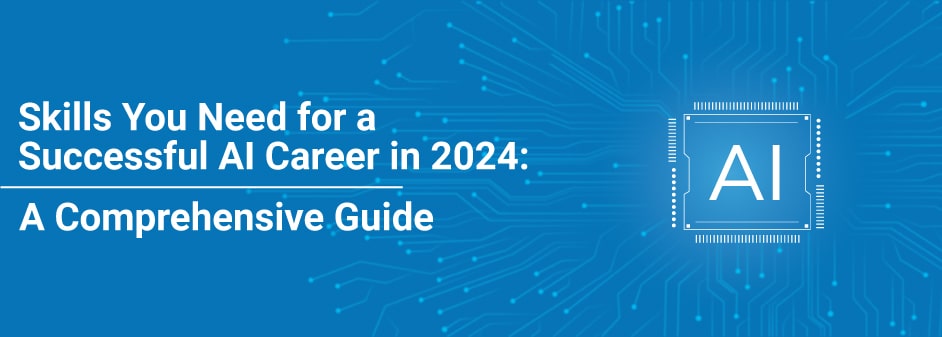Skills You Need for a Successful AI Career in 2024: A Comprehensive Guide

The field of Artificial Intelligence (AI) is expanding rapidly, offering numerous career opportunities for professionals with the right skill set. As AI continues to revolutionize industries, understanding the essential skills required for a successful career in this domain becomes crucial. This comprehensive guide delves into the critical technical and soft skills needed to thrive in an AI career in 2024.
Introduction
The AI industry is not just about developing algorithms and building models. It requires a blend of technical expertise and soft skills to solve complex problems and drive innovation. This guide outlines the essential skills needed to excel in an AI career in 2024.
The Importance of AI in 2024
AI continues to be a transformative force across various sectors, including healthcare, finance, retail, and more. Its significance lies in its ability to enhance efficiency, reduce costs, and enable new business models. Professionals skilled in AI are in high demand, making it a lucrative career choice.
Key Technical Skills
Programming Languages
Proficiency in programming languages is fundamental for AI professionals. Python remains the most popular language due to its simplicity and extensive library support. Other essential languages include R, Java, and C++.
Machine Learning Algorithms
Understanding and implementing machine learning algorithms is at the heart of AI. Familiarity with supervised, unsupervised, and reinforcement learning techniques is crucial. Mastering algorithms such as linear regression, decision trees, and neural networks is essential.
Data Analysis and Statistics
AI relies heavily on data. Skills in data preprocessing, cleaning, and visualization are vital. Statistical knowledge helps in understanding data distributions, correlations, and applying appropriate models.
Understanding Neural Networks
Neural networks form the backbone of deep learning. Knowledge of different types of neural networks, such as Convolutional Neural Networks (CNNs) and Recurrent Neural Networks (RNNs), is necessary for building complex AI models.
Familiarity with AI Frameworks and Libraries
AI development is accelerated by using frameworks and libraries. TensorFlow, PyTorch, and Keras are among the most widely used. Familiarity with these tools can significantly enhance productivity and model performance.
Essential Soft Skills
Critical Thinking
AI professionals must analyze problems critically and devise innovative solutions. Critical thinking involves evaluating information objectively and making reasoned judgments.
Problem-Solving
The ability to tackle complex issues creatively and efficiently is crucial. Problem-solving skills enable AI professionals to navigate challenges and find effective solutions.
Communication Skills
Clear communication is essential for collaborating with cross-functional teams and explaining AI concepts to non-technical stakeholders. It involves both verbal and written communication.
Adaptability
The AI field is dynamic, with continuous advancements and changes. Adaptability allows professionals to stay current with new technologies and methodologies.
Continuous Learning
AI professionals must commit to lifelong learning. Keeping up with the latest research, trends, and tools ensures they remain competitive in the field.
Combining Technical and Soft Skills
Success in AI requires a balance of technical prowess and soft skills. This combination enables professionals to implement advanced AI solutions while effectively working within teams and engaging with stakeholders.
Industry-Specific Applications of AI Skills
Different industries leverage AI uniquely. For instance, in healthcare, AI aids in diagnosis and personalized treatment plans, while in finance, it enhances fraud detection and risk management. Understanding industry-specific applications can tailor your skillset to niche markets.
Education and Certification Pathways
Various educational paths lead to a career in AI. Degrees in computer science, data science, and AI are common. Certifications from recognized institutions, such as Coursera, edX, and AI-focused bootcamps, can also bolster your credentials.
Building a Strong AI Portfolio
A robust portfolio showcasing your AI projects is vital. Include diverse projects demonstrating your skills in different areas of AI, such as natural language processing, computer vision, and predictive analytics.
Networking and Professional Development
Engage with the AI community through conferences, seminars, and online forums. Networking helps in staying updated with industry trends and provides opportunities for collaboration and career advancement.
Challenges in an AI Career
AI professionals may face challenges such as ethical considerations, data privacy issues, and the need for continuous learning. Addressing these challenges requires a proactive and informed approach.
Future Trends in AI Careers
Stay ahead by understanding future trends like explainable AI, AI ethics, and the integration of AI with other technologies like blockchain and IoT. Anticipating these trends can position you as a forward-thinking professional in the AI landscape.
Conclusion
Building a successful AI career in 2024 requires a blend of technical skills and soft skills. By mastering these areas, you can navigate the dynamic AI landscape and contribute to innovative solutions that drive progress across industries.
FAQs
What are the most important programming languages for AI?
Python, R, Java, and C++ are crucial for AI development.
Why are soft skills important in an AI career?
Soft skills like critical thinking and communication are essential for effective collaboration and problem-solving.
How can I keep up with the latest AI trends?
Engage in continuous learning through courses, certifications, and staying active in the AI community.
What industries offer the most opportunities for AI professionals?
Healthcare, finance, retail, and manufacturing are among the top industries leveraging AI.
What are some challenges faced by AI professionals?
Ethical considerations, data privacy issues, and the need for ongoing education are common challenges.
The field of Artificial Intelligence (AI) is expanding rapidly, offering numerous career opportunities for professionals with the right skill set. As AI continues to revolutionize industries, understanding the essential skills required for a successful career in this domain becomes crucial. This comprehensive guide delves into the critical technical and soft skills needed to thrive in an AI career in 2024.
Introduction
The AI industry is not just about developing algorithms and building models. It requires a blend of technical expertise and soft skills to solve complex problems and drive innovation. This guide outlines the essential skills needed to excel in an AI career in 2024.
The Importance of AI in 2024
AI continues to be a transformative force across various sectors, including healthcare, finance, retail, and more. Its significance lies in its ability to enhance efficiency, reduce costs, and enable new business models. Professionals skilled in AI are in high demand, making it a lucrative career choice.
Key Technical Skills
Programming Languages
Proficiency in programming languages is fundamental for AI professionals. Python remains the most popular language due to its simplicity and extensive library support. Other essential languages include R, Java, and C++.
Machine Learning Algorithms
Understanding and implementing machine learning algorithms is at the heart of AI. Familiarity with supervised, unsupervised, and reinforcement learning techniques is crucial. Mastering algorithms such as linear regression, decision trees, and neural networks is essential.
Data Analysis and Statistics
AI relies heavily on data. Skills in data preprocessing, cleaning, and visualization are vital. Statistical knowledge helps in understanding data distributions, correlations, and applying appropriate models.
Understanding Neural Networks
Neural networks form the backbone of deep learning. Knowledge of different types of neural networks, such as Convolutional Neural Networks (CNNs) and Recurrent Neural Networks (RNNs), is necessary for building complex AI models.
Familiarity with AI Frameworks and Libraries
AI development is accelerated by using frameworks and libraries. TensorFlow, PyTorch, and Keras are among the most widely used. Familiarity with these tools can significantly enhance productivity and model performance.
Essential Soft Skills
Critical Thinking
AI professionals must analyze problems critically and devise innovative solutions. Critical thinking involves evaluating information objectively and making reasoned judgments.
Problem-Solving
The ability to tackle complex issues creatively and efficiently is crucial. Problem-solving skills enable AI professionals to navigate challenges and find effective solutions.
Communication Skills
Clear communication is essential for collaborating with cross-functional teams and explaining AI concepts to non-technical stakeholders. It involves both verbal and written communication.
Adaptability
The AI field is dynamic, with continuous advancements and changes. Adaptability allows professionals to stay current with new technologies and methodologies.
Continuous Learning
AI professionals must commit to lifelong learning. Keeping up with the latest research, trends, and tools ensures they remain competitive in the field.
Combining Technical and Soft Skills
Success in AI requires a balance of technical prowess and soft skills. This combination enables professionals to implement advanced AI solutions while effectively working within teams and engaging with stakeholders.
Industry-Specific Applications of AI Skills
Different industries leverage AI uniquely. For instance, in healthcare, AI aids in diagnosis and personalized treatment plans, while in finance, it enhances fraud detection and risk management. Understanding industry-specific applications can tailor your skillset to niche markets.
Education and Certification Pathways
Various educational paths lead to a career in AI. Degrees in computer science, data science, and AI are common. Certifications from recognized institutions, such as Coursera, edX, and AI-focused bootcamps, can also bolster your credentials.
Building a Strong AI Portfolio
A robust portfolio showcasing your AI projects is vital. Include diverse projects demonstrating your skills in different areas of AI, such as natural language processing, computer vision, and predictive analytics.
Networking and Professional Development
Engage with the AI community through conferences, seminars, and online forums. Networking helps in staying updated with industry trends and provides opportunities for collaboration and career advancement.
Challenges in an AI Career
AI professionals may face challenges such as ethical considerations, data privacy issues, and the need for continuous learning. Addressing these challenges requires a proactive and informed approach.
Future Trends in AI Careers
Stay ahead by understanding future trends like explainable AI, AI ethics, and the integration of AI with other technologies like blockchain and IoT. Anticipating these trends can position you as a forward-thinking professional in the AI landscape.
Conclusion
Building a successful AI career in 2024 requires a blend of technical skills and soft skills. By mastering these areas, you can navigate the dynamic AI landscape and contribute to innovative solutions that drive progress across industries.
FAQs
What are the most important programming languages for AI?
Python, R, Java, and C++ are crucial for AI development.
Why are soft skills important in an AI career?
Soft skills like critical thinking and communication are essential for effective collaboration and problem-solving.
How can I keep up with the latest AI trends?
Engage in continuous learning through courses, certifications, and staying active in the AI community.
What industries offer the most opportunities for AI professionals?
Healthcare, finance, retail, and manufacturing are among the top industries leveraging AI.
What are some challenges faced by AI professionals?
Ethical considerations, data privacy issues, and the need for ongoing education are common challenges.




























